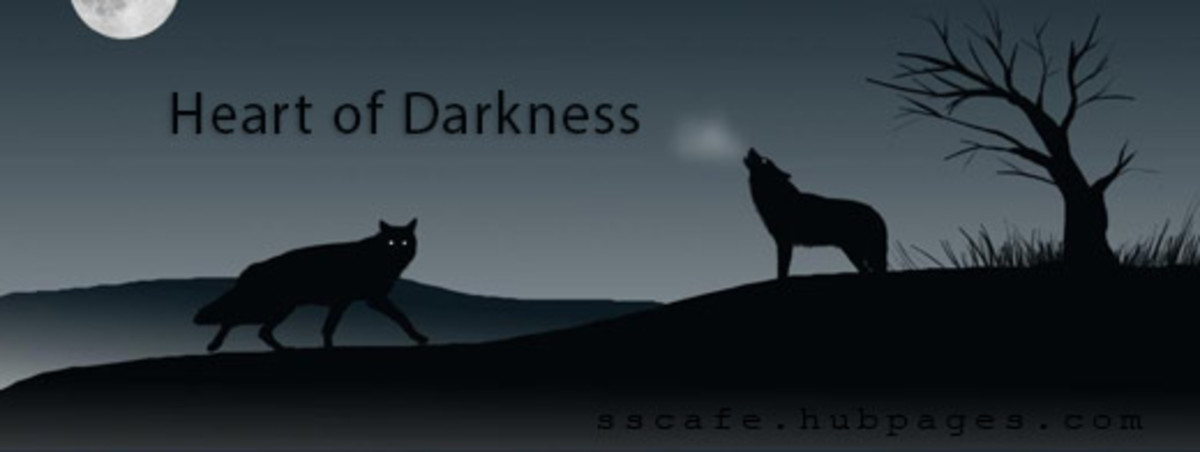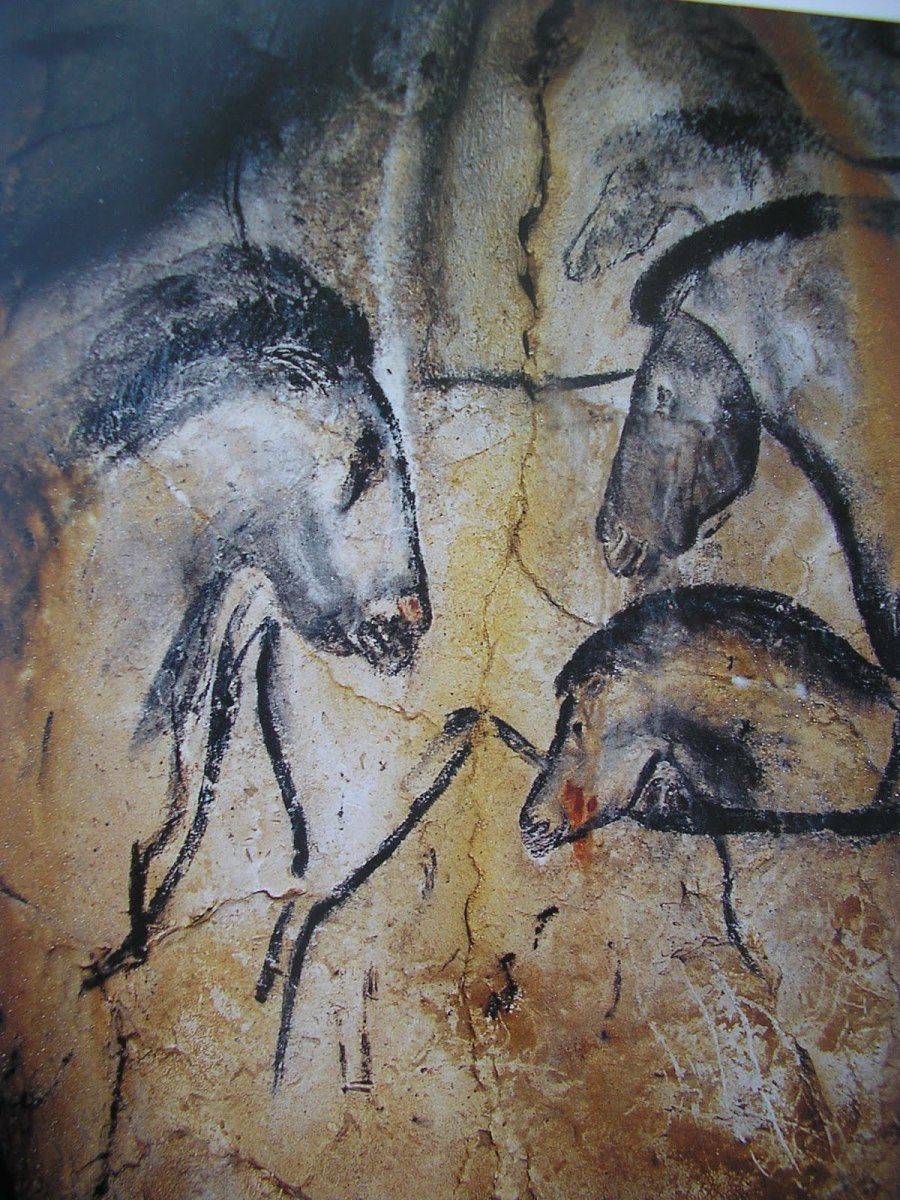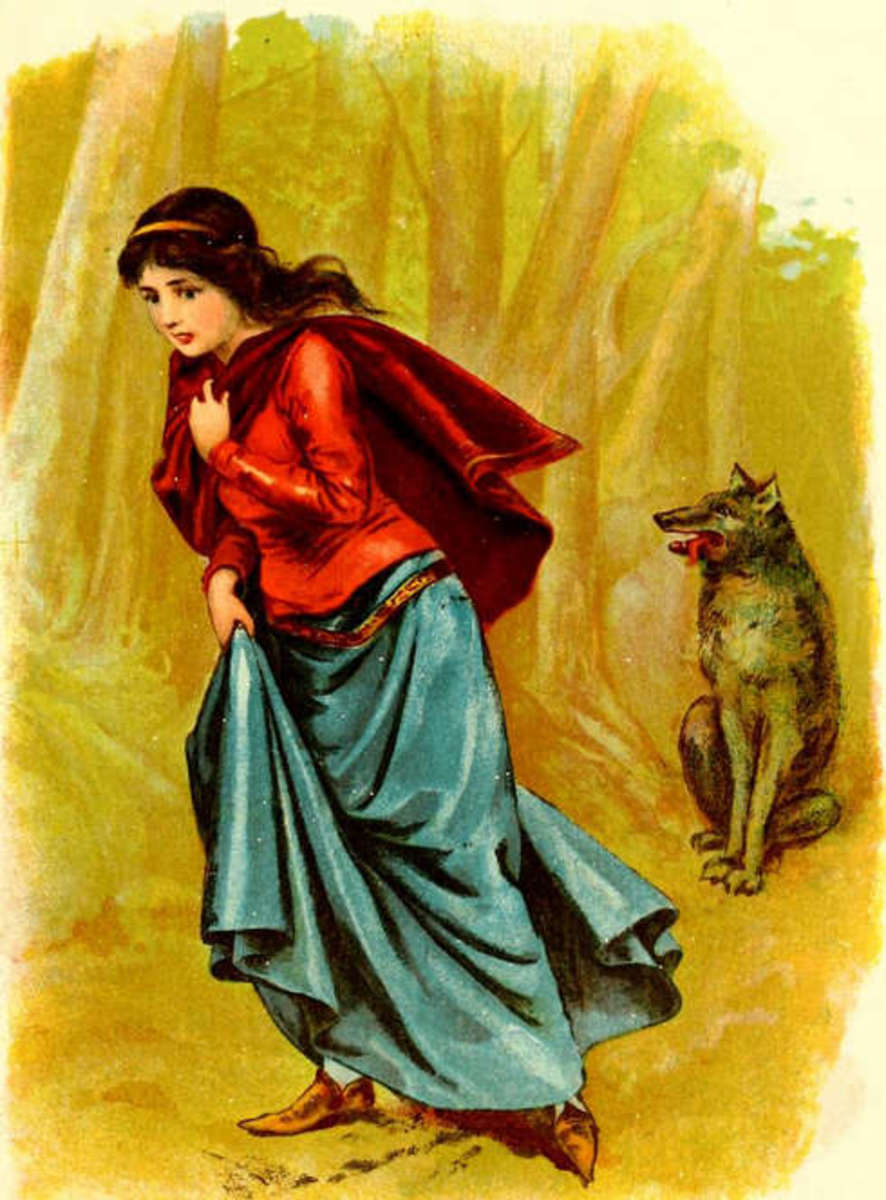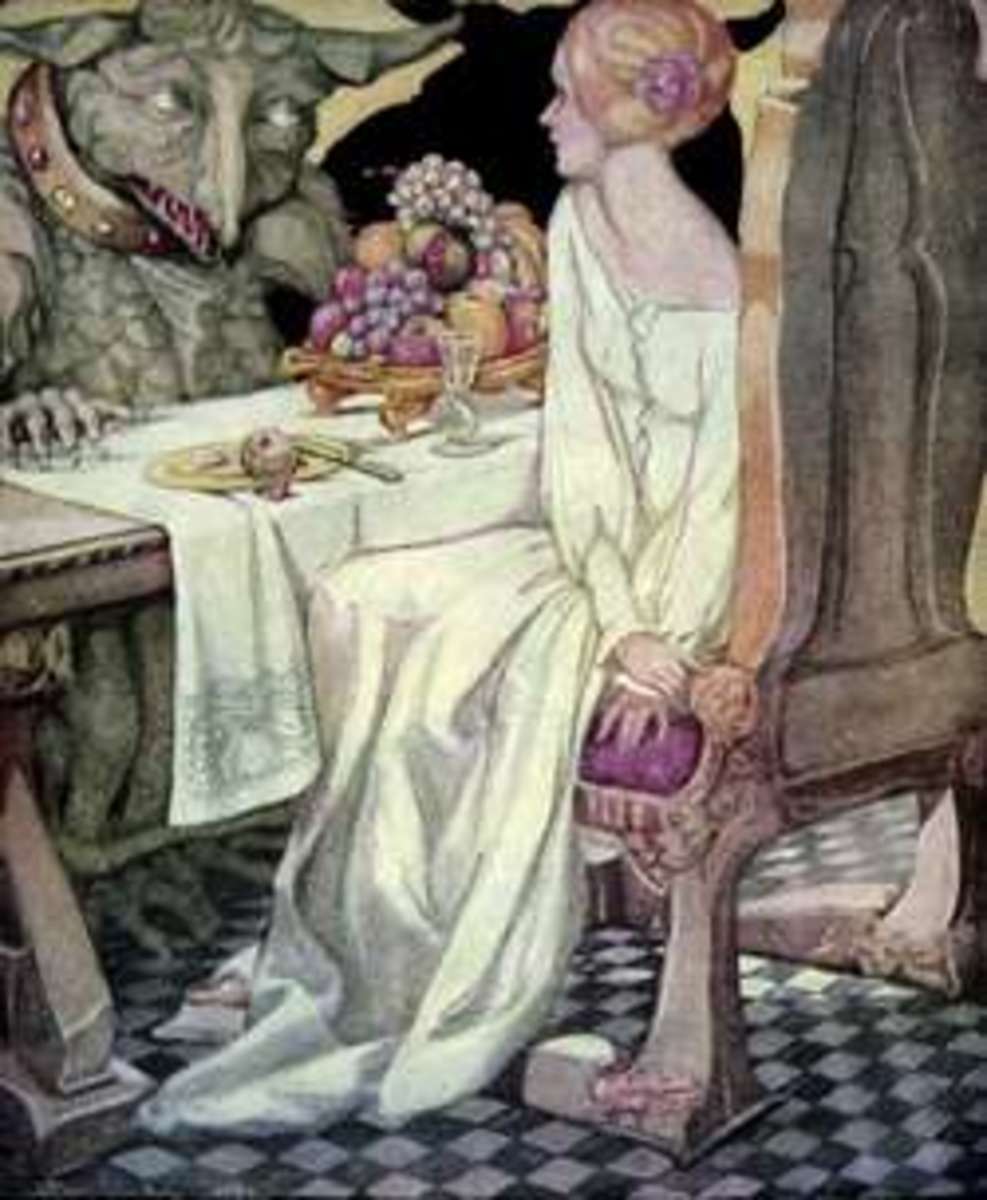Audiobook Classics: Heart of Darkness
History's Most Analyzed Novel?
According to WikiPedia:
“Literary professor Harold Bloom writes that Heart of Darkness has been analyzed more than any other work of literature that is studied in universities and colleges, which he attributes to Conrad's ‘unique propensity for ambiguity’.”
In fact, there is a WikiPedia page that is devoted entirely to “Themes from Heart of Darkness”. It discusses various motifs, light to dark, contrast, duality of human nature, and all the “big ideas” associated with Conrad’s masterpiece, none of which I read prior to my analysis. I didn’t avoid researching what the rest of the world has said about Heart of Darkness because I thought it might muddy my own reaction to the story, rather I wanted to get my thoughts down before my mind wandered, such was the urgency of my reaction to the novel this time around.
Of course Heart of Darkness is a wonderfully vivid, disturbing, suspenseful and horrifying story without even considering what it all might mean. It’s said that the story is almost entirely based on Conrad’s personal experience on a Belgian steamer during a trip up the Congo River, and that the characters are based on real people. What really happened and what has been imagined makes no difference in judging the value of the work, though I do find it fascinating to see how great authors often find inspiration in the real events that occur in their lives or in the lives of others. To Conrad, it may have been a pleasant surprise to discover that his fictionalized account of his journey up the Congo River was actually a complex allegory and commentary on the state of civilization. It is doubtful that is what he intended.
Kenneth Branagh

Kenneth Branagh, a signature performance
Like Colin Firth's rendition of The End of the Affair, Kenneth Branagh rocks Heart of Darkness and the voice of Marlow so convincingly you'll think you were on the deck with the crew. You'll be driving on the edge of your seat...
[This from Wikipedia] Born and raised in Belfast, Branagh has been nominated for five Academy Awards, the first man to be nominated for five different categories. His first two nominations were for Henry V (one each for directing and acting). He also received similar BAFTA Award nominations for his film work, winning one for his direction. His first BAFTA TV award came in April 2009, for Best Drama Series (Wallander). Branagh's two other Academy Award nominations were for the 1992 film short subject Swan Song and for his work on the screenplay of Hamlet in 1996. His most recent is for his portrayal of Lord Laurence Olivier in My Week With Marilyn.
A 3-Part Serial
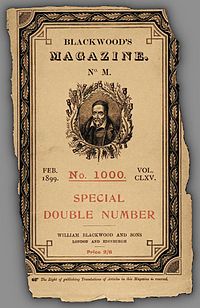
Man Without God
Regardless of the author’s intentions, half the fun of reading Heart of Darkness is to try and figure out what it all means. To me, Heart of Darkness is a story about the state of man without God, specifically a Christian God; for if there is one character in the novel that plays a huge role simply by the nature of His absence, it’s God and His love. (We could also argue that the depiction of the madman poisoned by the overpowering chaos of the jungle is analogous to man without the civilizing social structure of Religion, but since the focus in so intently on Kurtz the individual, what he seems to lack is personal faith in a loving God.)
Kurtz, in this model, is the fallen angel Satan, surrounded by his pagan supplicants who would just as soon eat each other and leave their heads on stakes. Evil corrupts. Power corrupts. Power in the service of evil is Satan personified and Kurtz, being as sly and intelligent as the devil in Ivan Karamazov’s dream, gave into temptation and fell from grace.
As in Apocalypse Now, Kurtz has become a God to the local natives by both demonstrating his might with the musket but also by adopting their ways. It’s clear that Kurtz the King has had his Queen during his sojourn in the jungle, and that he’s also participated in horrifying activities that have become addictive – the sheer rush of adrenaline the he must experience when the savages chow down on somebody from the tribe next door and then post the head on a stake; like addicts of horror films and folks that get off on ghastly photographs, Kurtz discovers a new and powerful thrill that, in the absence of the discipline of Western civilization, religion and God, corrupts his own definition of humanity.
Marlow, despite his outward insistence that Kurtz was a “remarkable man”, knows that Kurtz went over to “the dark side” and became a convert to the horrific depravity that he initially sought to heal. But rather than tell the real truth about him, he decided to uphold the myth, and in the last scene his decision to lie to Kurtz’s “intended” demonstrates the only smidgen of Christian mercy in the novel. He lies to save her vision of her beloved, a vision Marlowe knows has been poisoned by darkness, evil and the power it begets.
“…you were with him -- to the last?”
“…To the very end,” I said, shakily. “I heard his very last words…” I stopped in a fright.
“Repeat them,” she murmured…
I was on the point of crying at her “don’t you hear them?” The dusk was repeating them in a persistent whisper all around us, in a whisper that seemed to swell menacingly like the first whisper of a rising wind. “The horror! The horror!”
“His last word – to live with,” she insisted. “Don’t you understand I loved him-I loved him-I loved him!”
I pulled myself together and spoke slowly.
“The last word he pronounced was – your name.” (p. 109)
(Perhaps Conrad was just messing with us and intended “the horror” to be heard as “the whore”.)
Up until this ending, it appears that Marlow is becoming corrupted by Kurtz’s dark Satanic powers as well. The reader can easily see that Kurtz is not a particularly “remarkable man” so much as he is a “corrupt man”, and a madman. Marlowe’s strange protectiveness of Kurtz’s papers at first, and his eventual willingness to give them up, is an indication that the jungle mania and the “Kurtz worship” is releasing its grip on him.
But by showing this small bit of mercy to the woman who professes to love a man that Marlow never knew, nor can barely believe existed, he leads us to believe that he has not allowed himself to come under Kurtz’s spell completely. By leaving the reader in doubt of Marlow’s own remaining sanity at the end, Conrad’s tale remains open ended and in a way eternal for the story Marlow has told is but one example of man’s natural tendency, in the absence of God, to crave absolute power over others. In other words, to become God.
Movie with Tim Roth and John Malkovich
The Crazy Russian
In contrast, the Russian dressed in patchwork has been roaming the jungle for years and, while we know he must be a little nutty to be on a solo walkabout for so long, Marlow sums him up thusly:
“He surely wanted nothing from the wilderness but space to breathe in and to push on through. His need was to exist, and to move onwards at the greatest possible risk, and with a maximum of privation. If the absolutely pure, uncalculating, unpractical spirit of adventure had ever ruled a human being, it ruled this be-patched youth.” (p. 77)
I recall a similar character in Apocalypse Now, the blonde kid that blew his mind on drugs and seemed to be unfazed by the horrific events around him. The point being that the jungle, and savages, don’t corrupt in and of themselves, rather they corrupt those seeking power and seeking to play God.
About Joseph Conrad
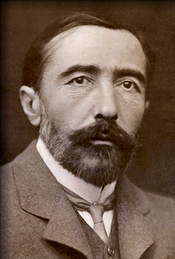
A Non-Native English Speaker?
[according to Wikipedia]
Joseph Conrad (born Józef Teodor Konrad Korzeniowski;[1]:11–12Berdichev, Imperial Russia, 3 December 1857 – 3 August 1924, Bishopsbourne, Kent, England) was a Polish author who wrote in English after settling in England. He was granted British nationality in 1886, but always considered himself a Pole.[note 1] Conrad is regarded as one of the greatest novelists in English,[2] though he did not speak the language fluently until he was in his twenties (and always with a marked accent). He wrote stories and novels, often with a nautical setting, that depict trials of the human spirit in the midst of an indifferent universe. He was a master prose stylist who brought a distinctly non-English[note 2] tragic sensibility into English literature.[3]
Amazing Narrative Skill
The great metaphor that I’m vaguely familiar with is that of the river representing the journey into man’s true nature, the core or heart of human existence which, without God or civilization, is no different than any animal’s existence. It is that portrait animalistic survival, eating one’s own, which I believe the philosopher Rousseau espoused as man’s true nature.
I think summing up Heart of Darkness in such a way is to do Conrad’s masterpiece a disservice, for there’s so much more to value than the “big idea”. Though there is some annoying repetition of dark imagery in the story, as well as some arcane language, it is still a stylistic triumph. Conrad, in my opinion, is truly unmatched in his ability to depict nature and truly visualize a scene such that it comes alive in the mind of the reader. The same can be said for his ability to build characters in three dimensions, from physical description to movement to the way an individual sounds, all of it in service to the story. And when it comes to describing the action, Conrad is unmatched.
(Not to mention the awesome performance by Kenneth Branagh, which every fan of Heart of Darkness needs to hear.)
Open the book to any page and you will find some jewel:
“…Watching the coast as it slips by the ship is like thinking about an enigma. There it is before you – smiling, frowning, inviting, grand, mean, insipid, or savage, and always mute with an air of whispering, Come and find out.”
I think it’s really such imagery, such command of language, that makes Heart of Darkness the memorable classic that it is, more so than questions about “man’s true nature”, which, if we’re to believe the jungle scene in the 19th century, would be to look at your fellow man like you would a side of beef.

